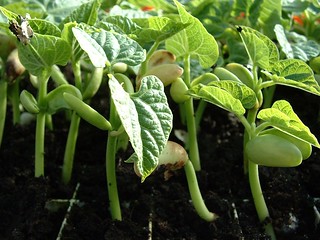But when you think about it, organic gardening is really a simple theory. For thousands of years before garden chemicals were invented, people have been growing things without the use of chemicals. The early settlers of our country didn’t have Miracle-Gro or Sevin Dust and they made out just fine. It only makes sense that we should be able to apply the same techniques and also get good results. We should grow food using Mother Nature's ingredients rather than concoctions born in a chemist's laboratory for the good of all of us.
| (Photo credit: Nick Saltmarsh) |
There are many, many advantages to gardening organically. Probably first and foremost is that food produced using organic agriculture is more nourishing and more healthful. In early August, 2001, the British organization, The Soil Association, reported that a comprehensive review of existing research revealed significant differences between organically and non-organically grown food.
These differences relate to food safety, primary nutrients, secondary nutrients and the health outcomes of the people who eat organically Vitamin C and dry matter contents are higher, on average, in organically grown crops then they are in non-organic crops. Mineral contents are also higher, on average, in organically grown crops. Food grown organically contains "substantially higher concentrations of antioxidants and other health promoting compounds than crops produced with pesticides."
Many people also think that organically grown foods taste better. Also, some foods grown without pesticides produce a higher amount of an anti-oxidant that has been found to reduce the risk of some cancers.
Overall, though, most people who enjoy organic gardening report that the enjoyment they derive is paramount to their decision to eschew chemicals in favor of the all-natural route. Many people like to watch the tender new growth come to full maturity and, as a bonus, you get to eat it!
With organic gardening, you get extra fresh vegetables. Naturally, corn on the cob and newly picked peas are especially noticeably fresh, but this trait extends to all vegetables you grow yourself, especially under the organic method, when they often have fuller and richer flavor.
| Organic purple broccoli (Photo credit: Nick Saltmarsh) |
For any gardener who still hasn't been convinced about the need to garden organically, here are some statistics that may help change your mind.
In March of 2001, the American Cancer Society published a report linking the use of the herbicide glyphosate (commonly sold as Round-up) with a 27% increased likelihood of contracting Non-Hodgkins Lymphoma. John Hopkins University also revealed that home gardeners use almost 10 times more pesticide per acre than the average farmer and that diseases caused by environmental illness, exposure to chemicals etc., is now the number one cause of death in the U.S. With the EPA's recent phasing out of common pesticides such as Dursban and Diazinon, we are now realizing that many of the chemicals that we thought were "safe" were never actually tested to see what their long-term effects on children, women, and the elderly could be.
The time has come to reassess our dependence on pesticides. The time to start gardening organically is now!



No comments:
Post a Comment